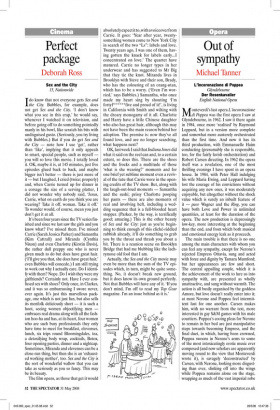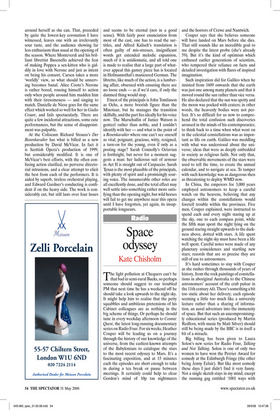Out of sympathy
Michael Tanner
L’incoronazione di Poppea Glyndebourne Der Rosenkavalier English National Opera
Monteverdi’s last opera L’incoronazione di Poppea was the first opera I saw at Glyndebourne, in 1962. I saw it there again in 1984, once more ‘realised’ by Raymond Leppard, but in a version more complete and somewhat more austerely orchestrated than the first time. And now it has its third production, with Emmanuelle Haim conducting (presumably she is responsible, too, for the fairly lavish orchestration) and Robert Carsen directing. In 1962 the opera itself was a revelation, one of the most thrilling evenings I have spent in an opera house. In 1984, with Peter Hall indulging his wife Maria Ewing, and Leppard having lost the courage of his convictions without acquiring any new ones, it was moderately enjoyable, but altogether without the shock value which is surely an inbuilt feature of it — pace Wagner and the Ring, you can have both Love and Power in unlimited quantities, at least for the duration of the opera. The new production is depressingly low-key, more interesting at the beginning than the end, and from which both musical and emotional energy leak as it proceeds.
The main trouble is that there is no one among the main characters with whom you can feel any sympathy, except for Nerone’s rejected Empress Ottavia, sung and acted with force and dignity by Tamara Mumford; but her appearances are few and short. The central appalling couple, which it is the achievement of the work to lure us into sympathy with, are presented as wholly unattractive, and sung without warmth. The action is all busily organised by the goddess Amore, but love doesn’t really enter into it; at most Nerone and Poppea feel intermittent lust for one another. Carsen makes him, with no warrant from the text, more interested in gay S&M games with his male courtiers. Poppea’s cooing pleas for Nerone to remain in her bed are just manipulative steps towards becoming Empress, and the final duet, in which, having been crowned, Poppea swoons in Nerone’s arms to some of the most intoxicatingly erotic music ever composed (and now scholars are apparently moving round to the view that Monteverdi wrote it), is savagely ‘deconstructed’ by Carsen, with Nerone, looking more disgusting than ever, slinking off into the wings while Poppea remains alone on the stage, wrapping as much of the vast imperial robe around herself as she can. That, preceded by quite the lowest-key coronation I have witnessed, leaves one with an irrelevantly sour taste, and the audience showing far less enthusiasm than usual at the opening of the season. Where Monteverdi and his brilliant librettist Busenello achieved the feat of making Poppea a sex-kitten who is giddily in love with Nerone and just as intent on being his consort, Carsen takes a more ‘worldly’ view, so what should be unnerving becomes banal. Alice Coote’s Nerone is rather bored, rousing himself to action only when people around him madden him with their tiresomeness — and singing to match. Danielle de Niese goes for the same effect which worked so well for her in Giulio Cesare, and fails spectacularly. There are quite a few incidental attractions, some cute performances, but the sense of disappointment was palpable.
At the Coliseum Richard Strauss’s Der Rosenkavalier has what is billed as a new production by David McVicar. In fact it is Scottish Opera’s production of 1999, but considerably modified. It is one of McVicar’s best efforts, with the often confusing action clarified, no perverse directorial intrusions, and a clear attempt to elicit the best from each of the performers. It is aided by superb, tireless orchestral playing, and Edward Gardner’s conducting is confident if on the heavy side. The work is considerably cut, but still lasts over four hours and seems to be eternal (not in a good sense). With fairly poor enunciation from most of the cast, one has to read the surtitles, and Alfred Kalisch’s translation is often guilty of mis-stresses, insignificant words get extended melodic expansion, much of it is unidiomatic, and all told one is made to realise that a large part of whatever appeal this gamey piece has is located in Hofmannsthal’s manicured German. The libretto, like much of the action, is a lumbering affair, obsessed with ensuring there are no loose ends — as if we’d care, if only the damned thing would stop.
Finest of the principals is John Tomlinson as Ochs, a more boorish figure than the Minotaur, but he manages the transition skilfully, and the part lies ideally for his voice now. The Marschallin of Janice Watson is genteel rather than noble, and I couldn’t identify with her — and what is the point of a Rosenkavalier where one can’t see oneself as vital, poignant, gracious, witty, resigned, a turn-on for the young, even if only as a posting stage? Sarah Connolly’s Octavian is forthright, but never for a moment suggests a man: her ludicrous suit of armour in Act II is straight out of Carpaccio. Sarah Tynan is the most plausible of the principals, with plenty of spirit and a promisingly soaring voice. The innumerable other roles are all excellently done, and the total effect may well settle into something rather more satisPM fying than the opening night, but wild horses will fail to get me anywhere near this opera until I have forgotten, yet again, its insupportable longueurs.











































































 Previous page
Previous page